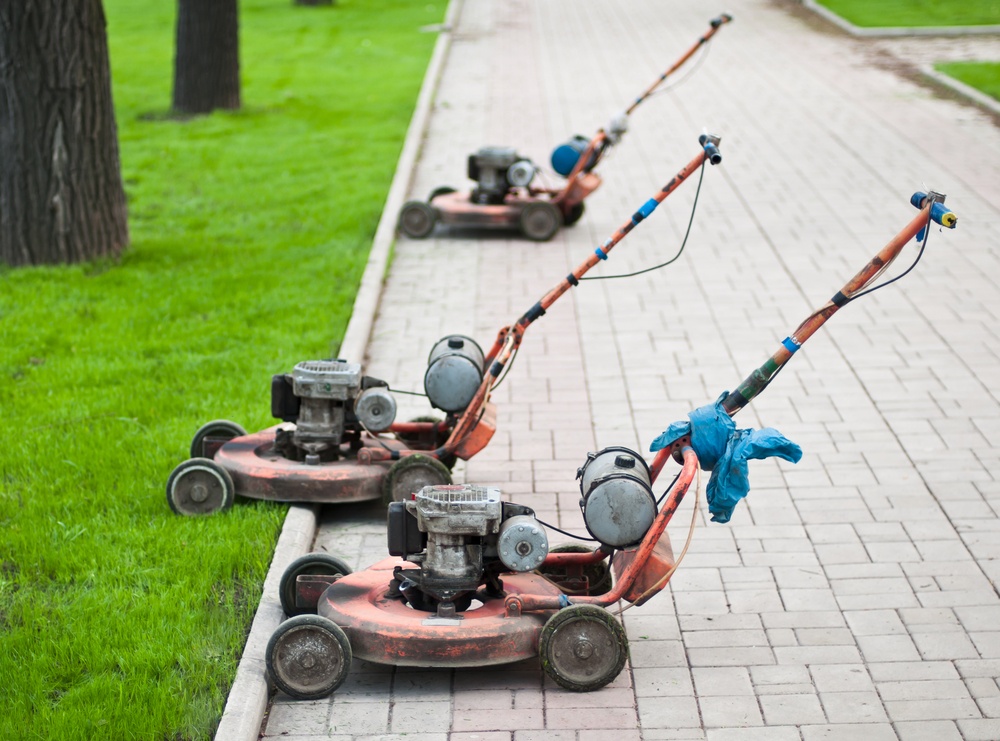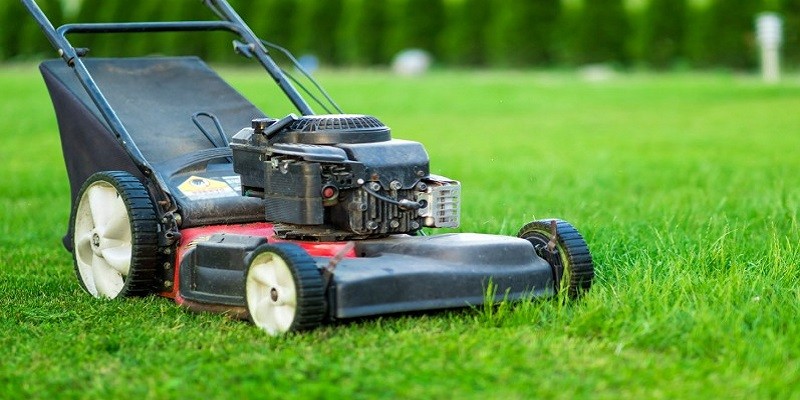Last Updated on January 15, 2025
To dispose of a lawnmower, drain any fuel or oil, remove the battery, and contact your local recycling center or waste management facility for proper disposal. Disposing of a lawnmower can be a challenging task, especially if you’re unsure of the correct procedure.
Whether your lawnmower is broken beyond repair or you have upgraded to a new model, it’s essential to handle its disposal responsibly. Improperly discarding a lawnmower can have negative environmental impacts, which makes it crucial to follow the correct steps.
We will discuss how to dispose of a lawnmower in an eco-friendly and responsible manner. By adhering to proper guidelines, you can ensure the smooth and environmentally conscious disposal of your lawnmower. So, let’s dive in and explore the right approach to get rid of your old lawnmower without harming the environment.
Factors To Consider Before Disposing Of Your Lawn Mower
Before disposing of your lawn mower, there are several factors to consider. Make sure to properly remove any hazardous materials, find a recycling or disposal facility, and consider donating or selling if the mower is still in good condition.
Before you dispose of your lawn mower, there are several important factors you need to consider. These factors include the age and condition of the lawn mower, the potential environmental impact, as well as any local regulations and guidelines that may be in place.
By taking these factors into account, you can ensure that you are making the most responsible and informed decision when it comes to getting rid of your lawn mower.
Age And Condition Of The Lawn Mower:
When deciding how to dispose of your lawn mower, it’s essential to consider its age and condition. Here are some key points to keep in mind:
- Age: Older lawn mowers may not be as efficient or environmentally friendly as newer models. If your lawn mower is nearing the end of its lifespan, it may be time to invest in a newer, more efficient model.
- Condition: If your lawn mower is in good working condition, you may want to consider selling or donating it instead of disposing of it. This can help extend its lifespan and reduce waste.
- Repairability: If your lawn mower is only in need of minor repairs, it may be worth fixing it instead of disposing of it. This can save you money and reduce your environmental impact.
- Safety: If your lawn mower is damaged or poses a safety risk, it’s important to take proper precautions when disposing of it. This may involve removing and properly disposing of any hazardous materials.
Environmental Impact:
Lawn mowers can have a significant impact on the environment, so it’s important to consider the most eco-friendly disposal options. Here are some things to consider:
- Recycling: Many lawn mower components, such as metal and plastic parts, can be recycled. Check with your local recycling center to see if they accept lawn mowers or specific components.
- Proper Disposal: If recycling is not an option, it’s important to dispose of your lawn mower properly. Many communities have specific guidelines for disposing of large appliances. Contact your local waste management facility to learn about proper disposal methods.
- Emissions: Gas-powered lawn mowers contribute to air pollution through emissions. If you’re upgrading to a more sustainable option, such as an electric or manual mower, you can reduce your environmental impact.
Local Regulations And Guidelines:
When it comes to disposing of your lawn mower, it’s crucial to understand and adhere to local regulations and guidelines. Here are some factors to consider:
- Local Waste Management: Check with your local waste management facility to determine if they have any specific guidelines or requirements for disposing of lawn mowers. They may have designated drop-off locations or procedures to follow.
- Hazardous Materials: Some lawn mowers contain hazardous materials, such as oil, gasoline, or batteries. These materials need to be handled and disposed of properly to prevent harm to the environment and public health. Find out how to safely remove and dispose of these materials.
- Donation and Sale: If your lawn mower is still in good condition, consider donating or selling it. Make sure to follow any local regulations regarding the sale of used equipment.
By considering the age and condition of your lawn mower, its environmental impact, and local regulations and guidelines, you can make a responsible decision when it comes to disposing of your lawn mower.
Donating Or Selling Your Lawn Mower
Wondering how to dispose of your old lawn mower? Consider donating it to a local charity or selling it online. Not only will you be getting rid of unwanted clutter, but you’ll also be helping someone in need or earning some extra cash.
If you have a lawn mower that you no longer need or use, donating or selling it can be a great way to pass it on to someone who can benefit from it. Not only will you be reducing waste by allowing someone else to use it, but you might also be able to make a little extra money or contribute to a good cause.
Here’s what you need to know about donating or selling your lawn mower:
Researching Local Organizations Or Individuals In Need
- Explore local charitable organizations, community centers, or non-profits that accept lawn mower donations. They may have programs in place to provide equipment to people in need.
- Contact churches or schools in your area to see if they could use a lawn mower for their groundskeeping needs.
- Look for online platforms or community forums where you can connect with individuals who may be interested in receiving a donated lawn mower.
Cleaning And Preparing Your Lawn Mower For Donation Or Sale
- Thoroughly clean your lawn mower, including removing grass clippings, debris, and dirt. This will ensure that it is in the best condition possible for donation or sale.
- Check the blades and ensure they are sharp and in good working order. Replace them if necessary.
- Test the engine and other components of the lawn mower to ensure it is functioning properly.
- Collect any accompanying accessories, such as the grass catcher or user manual, and make sure they are included.
Safely Transporting The Lawn Mower To The Recipient
- If you are donating your lawn mower, arrange a suitable time and place for the recipient to pick it up. Alternatively, consider offering delivery if feasible.
- If you are selling your lawn mower, determine the most convenient method of transportation for both you and the buyer. This could include arranging for pick-up or meeting at a mutually agreed location.
- Safely secure the lawn mower for transport to prevent damage during transit. Consider using straps or a cover to protect it.
Remember, before donating or selling your lawn mower, it’s important to ensure that it is in good working condition and adheres to any relevant safety requirements. By properly researching and preparing your lawn mower, you can help extend its life and benefit those in need or looking to purchase one.
Recycling Your Lawn Mower
Recycling your lawn mower is an eco-friendly way to dispose of it. Find a local recycling center or contact your municipality for proper disposal options.
If you’re looking to dispose of your old lawn mower in an eco-friendly way, recycling is the way to go. Recycling not only helps reduce waste but also allows the valuable materials from your lawn mower to be reused. Here’s how you can responsibly recycle your lawn mower:
Finding A Local Recycling Center Or Scrap Metal Facility:
- Research local recycling centers or scrap metal facilities in your area that accept lawn mowers for recycling.
- Check if they have specific requirements or procedures for accepting lawn mowers.
- Ensure that the recycling center or scrap metal facility is reputable and follows proper recycling protocols.
- Consider contacting them beforehand to inquire about any fees, documentation, or scheduling requirements.
Preparing Your Lawn Mower For Recycling:
- Before recycling your lawn mower, clean it thoroughly to remove any debris, grass clippings, or oil spills.
- Drain all the fluids, including gasoline and oil, following safety guidelines and local regulations.
- Remove any attachments or accessories that are not recyclable, such as bagging systems or mulching blades.
- If possible, disassemble larger parts of your lawn mower to make it easier for recycling and transportation.
Following Proper Disposal Procedures At The Recycling Center:
- Once you arrive at the recycling center or scrap metal facility, follow their instructions regarding drop-off or pickup services.
- Provide any necessary documentation or identification required by the facility.
- If applicable, be prepared to pay any recycling fees if they are involved.
- Leave your lawn mower at the designated drop-off area or hand it over to the facility staff for further processing.
By recycling your old lawn mower, you’ll not only keep it out of the landfill but also contribute to the conservation of resources. So, take the initiative and responsibly dispose of your lawn mower through recycling. Together, we can make a positive impact on the environment.
Oil, Gasoline, And Other Fluids
Dispose of your lawn mower properly by handling oil, gasoline, and other fluids safely. Avoid environmental harm and follow local regulations for responsible disposal. Keep your lawn and the planet healthy.
Draining And Properly Storing Hazardous Fluids
When it’s time to dispose of your lawn mower, it’s important to properly handle and dispose of any hazardous fluids it may contain. This includes oil, gasoline, and other fluids that can be harmful to the environment if not disposed of correctly.
Below, we will explore the steps you can take to safely drain and store these fluids before recycling or disposing of them responsibly.
Draining the fluids:
- Start by finding the drain plugs for the oil and gas tanks on your lawn mower.
- Place a suitable container beneath the drain plug to catch the fluids.
- Unscrew the drain plugs using the appropriate tools, taking care not to spill any fluids in the process.
- Allow the fluids to drain completely into the container.
Properly storing hazardous fluids:
- Use a secure and labeled container to store the drained fluids separately.
- Make sure the containers are tightly sealed to prevent leakage.
- Store the fluids in a cool, dry place away from any ignition sources or heat.
- Keep the fluids out of reach of children and pets.
- Consider using childproof caps or storing the containers in a locked cabinet for added safety.
Recycling Or Disposing Of Oil And Gasoline
Once you have properly drained and stored the hazardous fluids from your lawn mower, you will need to determine the best way to recycle or dispose of them. It is crucial to handle these substances responsibly to prevent harm to the environment and ensure compliance with local regulations.
Here are some options for recycling or disposing of oil and gasoline:
Recycling oil and gasoline:
- Check with your local recycling centers or gas stations to see if they accept used oil and gasoline.
- If they do, transfer the fluids to a suitable container and bring them to the designated recycling location.
- Follow any specific instructions provided by the recycling facility for drop-off and container requirements.
Disposing of oil and gasoline:
- Contact your local waste management facility or environmental agency to inquire about hazardous waste disposal programs.
- They may provide specific guidelines on how to safely dispose of oil and gasoline.
- Avoid pouring these fluids down the drain, into the soil, or throwing them in the regular trash, as this can have harmful effects on the environment.
Remember, proper disposal of hazardous fluids is essential for a greener environment. By draining and storing these fluids correctly before recycling or disposing of them responsibly, you are doing your part in preserving our planet’s natural resources.
Batteries And Electrical Components
Dispose of your lawn mower safely by properly handling batteries and electrical components. Follow these steps to ensure the environmentally friendly disposal of your lawn mower and its parts.
When it comes to disposing of a lawn mower, it’s important to properly handle the batteries and electrical components. These parts can be hazardous if not dealt with correctly. In this section, we will discuss how to safely remove and store batteries, as well as how to recycle or dispose of them properly along with other electronic components.
Removing And Storing Batteries Safely
To ensure your safety and protect the environment, it’s crucial to follow proper procedures when removing and storing batteries from your lawn mower. Here are some guidelines to help you with this process:
- Begin by consulting the manufacturer’s instructions to identify the type of battery used in your lawn mower.
- Disconnect the negative terminal first, followed by the positive terminal, to avoid any electrical shock.
- Use insulated gloves and tools to handle the battery, as it may contain corrosive materials.
- Clean the battery terminals and make sure they are free from any dirt, debris, or corrosion.
- Store the battery in a cool and dry place, away from direct sunlight and extreme temperatures.
- Keep the battery in an upright position to prevent leaks or spills.
Recycling Or Disposing Of Batteries And Electronics
Now that you’ve safely removed and stored the batteries, it’s important to dispose of them properly. Here are some options for recycling or disposing of batteries and other electronic components:
- Check with your local recycling center or municipality to find out if they have specific collection points for batteries and electronics. They may have designated drop-off locations or scheduled collection events.
- Retailers that sell batteries often have recycling programs in place. Many of them offer drop-off bins for customers to safely dispose of their old batteries.
- Some manufacturers and third-party organizations offer mail-in recycling programs for batteries and electronics. You can package your old batteries and send them back for safe disposal.
- Make sure to remove any personal data or information from electronic devices before disposing of them. Use factory reset options or wipe the data securely.
- Avoid throwing batteries or electronics in the regular trash, as they can contaminate the environment and pose a risk to human health.
Remember, proper disposal of batteries and electrical components is essential for the environment and your safety. By following the guidelines above, you can ensure that these items are recycled or disposed of in the right way.
Blades And Other Sharp Objects
Dispose of your lawn mower safely by first removing the blades and other sharp objects. Take caution to prevent injuries while following proper disposal procedures.
Safely Removing And Replacing Lawn Mower Blades
When it comes to maintaining your lawn mower, one of the most important tasks is properly removing and replacing the blades. Here are some tips on how to do it safely and efficiently:
- Inspect the blades: Before removing the blades, take a few moments to inspect them. Look for any signs of damage or dullness. If the blades are nicked or severely worn, it may be time to replace them altogether.
- Secure the mower: Before working on the blades, make sure the lawn mower is powered off and the spark plug is disconnected. Additionally, secure the mower in an elevated position to access the blades with ease.
- Use protective gear: Safety should always be a top priority when working with sharp objects. Wear gloves and protective eyewear to shield yourself from any potential injuries.
- Remove the blades: Using a wrench or socket set, loosen and remove the bolts that secure the blades to the lawn mower deck. Make sure to keep track of the bolts and washers, as you will need them for reinstallation.
- Inspect the blade area: While the blades are removed, take the opportunity to clean any debris or grass clippings that may have accumulated in the blade area. This will help optimize the performance of your lawn mower.
- Sharpen or replace blades: If the blades are dull but not damaged, you can sharpen them using a blade sharpener or file. Follow the manufacturer’s instructions for the best results. However, if the blades are beyond repair, replace them with new ones to ensure a clean cut on your lawn.
- Reinstall the blades: Once the blades are sharpened or replaced, it’s time to reinstall them. Carefully position the blades on the mower deck, aligning the mounting holes with the corresponding bolts. Tighten the bolts securely using the wrench or socket set.
Proper Storage And Disposal Of Sharp Objects
Properly storing and disposing of sharp objects is essential to prevent accidents and harm to others. Follow these guidelines to ensure safe handling and disposal:
- Secure storage: Store sharp objects, such as removed lawnmower blades, in a locked and sturdy container. This prevents accidental injuries and keeps them out of reach of children and pets.
- Labeling: Clearly label the container as “Sharp Objects” or “Blades” to indicate the potential danger. This helps others identify the contents and handle them cautiously if necessary.
- Recycling options: Check with your local recycling center or waste management facility to find out if they accept lawnmower blades or other sharp objects for recycling. Some centers have specific guidelines on how to dispose of them properly.
- Community disposal events: Many communities organize hazardous waste or sharp object disposal events periodically. Take advantage of these opportunities to safely dispose of your lawnmower blades and other sharp objects.
- Proper disposal: If recycling or community disposal events are not available, contact your local landfill or waste management authorities to inquire about proper disposal methods for lawnmower blades. They may have specific instructions on how to safely dispose of these sharp objects.
Remember, safety should always be your top priority when handling and disposing of sharp objects like lawnmower blades. Following these guidelines will not only protect you and others but also promote environmental responsibility.
Other Non-Recyclable Parts
Dispose of your lawnmower’s other non-recyclable parts responsibly to reduce environmental impact. Follow local regulations and consider contacting local waste management facilities for proper disposal methods.
Understanding Which Parts Cannot Be Recycled:
When it comes to disposing of a lawn mower, it’s essential to know which parts can and cannot be recycled. Some components are not recyclable due to their materials or construction. Here are the non-recyclable parts to keep in mind:
- Engine: The engine of a lawn mower contains hazardous fluids, such as oil and gasoline, making it unsuitable for recycling.
- Gas Tank: Similar to the engine, the gas tank may still contain flammable fluids, preventing it from being recycled.
- Muffler: The muffler is often made of metals that cannot be easily recycled due to their composition.
- Blades: Lawn mower blades are typically made of steel or other metals, making them difficult to recycle without proper processing.
Disposing Of Non-Recyclable Parts In Accordance With Local Regulations:
To dispose of non-recyclable lawn mower parts, it is crucial to follow local regulations and guidelines. Here are some recommended steps to ensure proper disposal:
- Check Local Regulations: Research your local waste management regulations to understand how non-recyclable items should be disposed of in your area.
- Drain Fluids Safely: Before discarding the engine or gas tank, ensure both are completely drained of any remaining fluids. Follow proper safety protocols and dispose of these hazardous materials according to local guidelines.
- Separate and Package: Separate the non-recyclable parts from any recyclable components of the lawn mower. This will make it easier for disposal and potential recycling of other parts.
- Seek Authorized Collection Points: Look for authorized collection points or recycling facilities that accept lawn mower parts. These facilities may have specific instructions on how to drop off or package the non-recyclable items.
- Arrange for Special Pickup: In some cases, you may need to arrange a special pickup service to collect the non-recyclable parts. Check with your local waste management authorities for any necessary arrangements.
Remember to always prioritize environmental responsibility when disposing of non-recyclable lawn mower parts. By following local regulations and guidelines, you can ensure a proper and eco-friendly disposal process.

Credit: info.junk-king.com
Frequently Asked Questions On How To Dispose Of A Lawn Mower?
Does Home Depot Take Your Old Lawn Mower?
Home Depot accepts old lawn mowers.
How Do You Get Rid Of A Lawn Mower?
To get rid of a lawn mower, consider donating it to a local organization or selling it online.
How Do I Dispose Of A Lawn Mower Near Me?
To dispose of a lawn mower near you, take it to a local recycling center or contact your municipality for collection options.
How Do You Get Rid Of A Gas Lawn Mower?
To get rid of a gas lawn mower, empty the fuel tank, remove any oil or gas residue, and dispose of it according to local regulations.
How To Dispose Of A Lawn Mower Without Pollution?
You can dispose of a lawn mower without pollution by taking it to a recycling center or donating it to a local organization that accepts old lawn equipment.
Conclusion
Responsibly disposing of a lawn mower is crucial to protect the environment and ensure safety. By following the proper steps, you can ensure that your old or broken mower does not end up in a landfill or harm anyone. Consider recycling options, such as checking with local recycling centers or contacting the manufacturer for disposal recommendations.
Donating a functional lawn mower to a charitable organization or selling it can also be great alternatives to simply throwing it away. Remember to drain the gas and oil properly, remove any hazardous parts, and take precautions when handling the machine.
Taking the time to dispose of your lawn mower correctly demonstrates your commitment to sustainable living and environmental responsibility. So, next time you’re faced with the task of getting rid of your old mower, opt for an eco-friendly solution that benefits both you and the planet.







